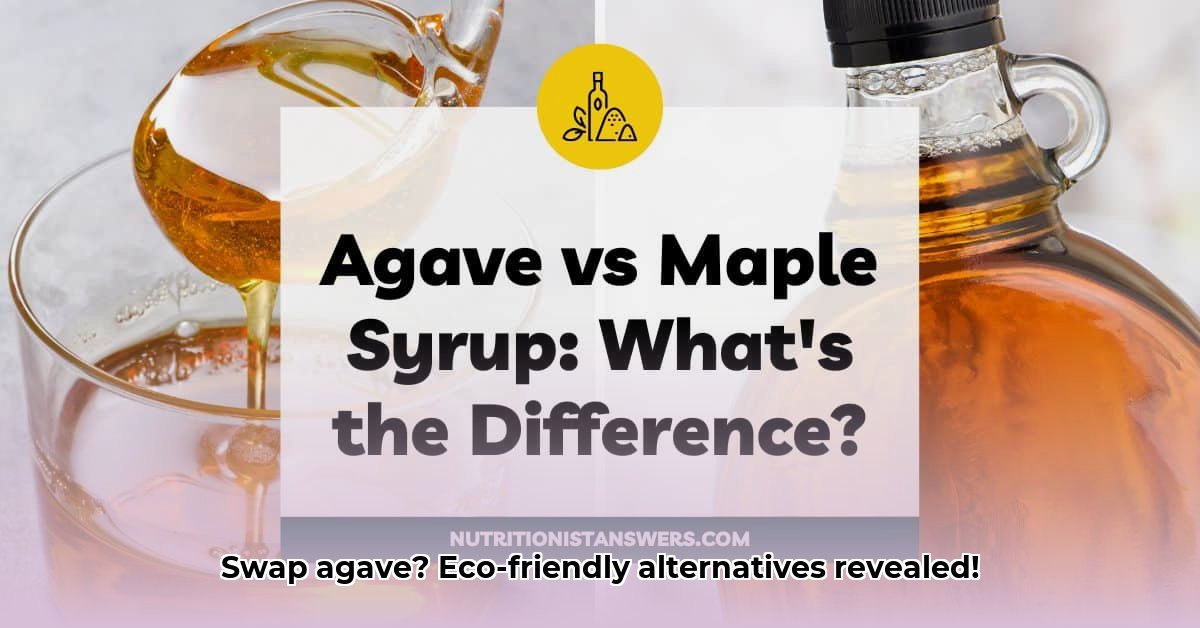Agave nectar is known for its smooth sweetness, but it’s high in fructose and not the best for the planet. This guide helps you find delicious and eco-friendly swaps, comparing taste, environmental impact, and cost. Let’s find the perfect sugar substitute! For other healthy cooking oil alternatives, check out this guide on coconut oil substitutes.
Agave Syrup Substitute: Eco-Friendly Sweetener Options
Agave, once a health food hero, now faces questions about its high fructose content and environmental impact. Here are delicious and planet-friendly alternatives to agave, helping you make informed choices for baking, cooking, and lifestyle.
Sustainable Sweeteners: A Side-by-Side Comparison
Picking the right agave replacement means considering sweetness, taste, and the planet’s well-being. Let’s compare popular options, weighing taste, sustainability, and ease of use, also how to use sustainable sugars effectively.
| Agave Syrup Substitute | Sustainability Story | Flavor Profile | Cooking & Baking Uses | Cost |
|---|---|---|---|---|
| Maple Syrup | Production methods and sourcing practices greatly affect the environmental footprint; look for sustainable and fair-trade options. Consider the source; some maple syrup production can contribute to deforestation. Seek out certifications that prioritize responsible forest management. | Rich, robust, with caramel notes; can be quite strong. The darker the syrup, the stronger the flavor. | Pancakes, waffles, baking, glazes, and more. Excellent in sauces, marinades, and dressings where a distinct sweetness and maple flavor is desired. Use it in baked goods like muffins, cookies, and cakes. It can also be used to sweeten beverages like coffee and tea, but can change the flavor of the drink. | Usually more expensive |
| Honey | Bee health and responsible harvesting are crucial. Local, raw honey from reputable sources is generally better for the environment and bees. Support beekeepers who prioritize bee welfare and sustainable practices. Avoid honey from large-scale operations that may harm bee populations. | Varies wildly based on the flowers the bees visited; can be complex and floral or subtly sweet. Different types of honey (e.g., wildflower, clover, orange blossom) offer unique flavor profiles. | Baking, tea, yogurt, salad dressings, marinades. Great as a spread, in oatmeal, and as a natural remedy for sore throats. It is more acidic than agave and can affect the texture of baked goods. It can also be used in cocktails. When baking, honey may cause baked goods to brown faster, so it may assist to lower your oven temperature. | Price varies widely depending on source |
| Brown Rice Syrup | Processing can have environmental consequences; choose organic options for a potentially smaller impact. Look for brands employing sustainable farming and processing techniques. Be aware that brown rice syrup has a higher glycemic index than some other sweeteners. | Mild, slightly caramel-like; less intense sweetness. A good neutral sweetener that does not overpower other flavors. | Baking, cereals, as a sweetener in sauces. Ideal for those seeking a vegan and gluten-free option. It’s often used in energy bars and granola. When baking, it can create a chewier texture. | Generally affordable |
| Coconut Sugar | Sustainable farming practices are critical; excessive water use and deforestation are potential concerns. Ensure your coconut sugar comes from responsibly managed farms that prioritize environmental sustainability. | Similar to brown sugar; subtle caramel notes. Offers a slightly more complex flavor than white sugar. | Baking, coffee, smoothies. It can be used as a 1:1 replacement for white sugar and brown sugar in baking. It can be used to sweeten beverages like coffee, tea, and cocktails. It can be used in sauces and marinades. | Moderately priced |
| Date Syrup | Relatively sustainable if sourced locally. Water usage during production is a factor. Choose date syrup from regions with abundant water resources or farms employing water-efficient irrigation methods. Consider the processing methods used, as some may be more energy-intensive than others. | Rich, deep sweetness; hints of caramel and dates. Its strong flavor can add depth to dishes. | Baking, sauces, glazes, desserts. Great in smoothies, oatmeal, and yogurt. It can also be used as a topping for pancakes and waffles. It can be used as a natural food coloring. It’s a great source of antioxidants, potassium, and magnesium. | Moderately priced |
| Simple Syrup (Homemade) | Sustainability entirely depends on the sugar used; opt for organic cane sugar. Choose organic cane sugar and consider using filtered water to minimize your environmental impact. Making your own simple syrup reduces packaging waste. | Neutral sweetness; easily adjusted with extracts. A blank canvas for flavor customization. | Beverages, desserts, marinades; a blank canvas for flavor. It dissolves easily in cold liquids and can be used to sweeten cocktails, iced tea, and lemonade. It can also be used in desserts like ice cream, sorbet, and fruit salads. | Very affordable |
| Yacon Syrup | Relatively sustainable; unique fructans offer a different kind of sweetness. Research the harvesting and processing methods used by different yacon syrup producers. Look for brands that prioritize sustainable farming practices and fair labor standards. | Sweet and slightly tart; can have a unique texture. Its flavor is often described as a combination of caramel, apple, and molasses. | Baking, yogurts, eaten on its own as a treat. Great in smoothies, oatmeal, and yogurt. It can also be used as a topping for pancakes and waffles. It can be used as a prebiotic. Be aware that it may cause digestive issues in some people. | Premium priced |
| Monk Fruit Sweetener | Production methods vary, but this is a highly efficient plant; Generally considered sustainable. Choose monk fruit sweeteners that are minimally processed and free from additives. Look for brands that support sustainable farming practices and fair labor standards. | Exceptionally sweet; use sparingly. It has no calories and does not raise blood sugar levels | Baking, drinks, as a sweetener in various foods. It can be used to sweeten beverages like coffee, tea, and lemonade. It can also be used in desserts like ice cream, sorbet, and fruit salads. It may have a slight aftertaste that some people find unpleasant. | Premium priced |
Making the Sweet Switch: Substitution Tips
Substituting agave isn’t just about matching sweetness; it’s about getting the texture and taste right. Here’s a helpful guide on agave syrup alternatives:
Step 1: Assess Your Recipe. Are you making cakes, cookies, sauces, or drinks? The best substitute will depend on what you’re cooking or baking. Achieving the right sweetness requires adjustments. Consider the desired texture and flavor profile of your final product.
Step 2: Consider Flavor Profiles. Do you need a strong, caramel-like flavor (maple syrup)? A delicate, floral hint (honey)? Or a neutral base (simple syrup)? Matching the flavors is key to a successful swap. Think about how the substitute’s flavor will complement or contrast with other ingredients in your recipe.
Step 3: Adjust Quantities. Sweeteners vary in intensity. You might not need a one-to-one substitution. For example, for every cup of agave, you might only need ¾ to 1 cup of maple syrup or honey in baking. Brown rice syrup and coconut sugar may require slight recipe adjustments. Start with a smaller amount than you think you need, and then add more to taste.
Step 4: Experiment Carefully. Baking is a science. The first time you swap sweeteners, start with a small batch to see how the changes affect your recipe. You might need to make adjustments based on the specific recipe and the sweetener you choose. Keep detailed notes of your experiments so you can replicate successful substitutions in the future.
Choosing the Perfect Agave Replacement: Your Personal Guide
The “best” agave replacement depends on you and your goals. What’s most important to you? Taste, price, the environment, or finding the best natural sweeteners?
**For the Flavor-Focused Home
- Why Am I Always Thinking About Food? Your Body and Brain Explain - February 2, 2026
- Healthy Eating Is About Quality, Not Just Calories - February 1, 2026
- Healthy Living Products to Elevate Your Wellness Routine - January 31, 2026










